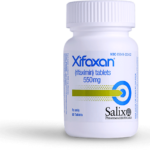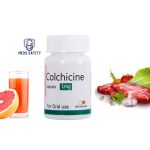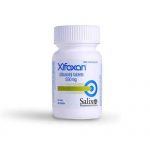List of Foods To Avoid While Taking Xifaxan

Xifaxan is a brand of rifaximin an oral antibiotic previously marketed for the treatment of traveler’s diarrhea and hepatic encephalopathy. It is now also labeled for the treatment of irritable bowel syndrome (IBS) with diarrhea. Irritable bowel syndrome (IBS) is a common disorder that affects the large intestine. Signs and symptoms include cramping, abdominal pain, bloating, gas, and diarrhea or constipation, or both. IBS is a chronic condition that you’ll need to manage long-term.
Xifaxan has activity against anaerobic, gram-positive, and gram-negative bacteria, including Clostridium difficile. It is not systemically absorbed and is active only in the gastrointestinal tract. It may work by reducing bacterial byproducts and altering intestinal microbiota.
Between 3 percent and 20 percent of Americans experience irritable bowel syndrome (IBS) symptoms. The condition affects more women than men. Some people with IBS have minor symptoms. However, for others, the symptoms are significant and disrupt daily life.
How should I take Xifaxan (rifaximin)?
The recommended dosage regimen for Xifaxan (rifaximin) is as follows:
Traveler’s diarrhea: Take 1 tablet (200 mg of rifaximin) by mouth 3 times daily (every 8 hours) for 3 days
Diarrhea in Irritable Bowel Syndrome: Take 1 tablet (550 mg of rifaximin) by mouth 3 times daily (every 8 hours) for 14 days
Hepatic encephalopathy: Take 1 tablet (550 mg of rifaximin) by mouth 2 times daily (every 12 hours)
What foods should I avoid while taking Xifaxan (rifaximin)?
People taking Xifaxan (rifaximin) especially for IBS should avoid the following foods so as not to aggravate symptoms:
- Milk: Milk and other foods that contain lactose, like cheese and ice cream, can cause gas and bloat in people who are lactose intolerant. About 70% of adults worldwide do not produce large amounts of lactase, an intestinal enzyme that helps break down the sugar in milk. Without this enzyme, the small intestine cannot absorb lactose, which passes undigested into the colon, where bacteria ferment and cause gas. Even though dairy products are the major culprits of discomfort for some IBS sufferers, yogurt proves to be an exception. The live cultures in the yogurt break down the lactose, so it’s less likely to cause gassy symptoms.
- Foods High in Fructose: High fructose corn syrup is the main ingredient in processed foods, commercially prepared sweets, snacks, and soft drinks, and these items can aggravate IBS symptoms. But they are not the only source of blame (or bloat). It turns out some very healthy foods like apples, pears, and dried fruits are naturally high in fructose, which when ingested, can trigger some of the same side effects as undigested lactose. Fruits lower in fructose, such as berries, citrus, and bananas, may be a better choice for people with IBS.
- Carbonated Beverages: Because the bubbles in beverages like soda and seltzer can produce a similar fizzy effect in the GI tract, stick with water and lactose-free milk to quench your thirst. And before you think about adding juice to that list — remember that fruit-based drinks are frequently high in fructose!
- Caffeine: Caffeine can increase diarrhea, another major symptom of IBS. High sources of caffeine include coffee, tea, cola drinks, chocolate, and some over-the-counter pain relievers designed for headache relief — check labels carefully.
Sugar-free Chewing Gums: Many sugar-free gums are made with artificial sweeteners such as sorbitol and xylitol, which have been shown to cause diarrhea. In addition, chewing gum leads to more swallowed air and gassiness.
What other drugs will affect Xifaxan (rifaximin)?
Tell your doctor about all your other medicines, especially:
• an antibiotic–clarithromycin, erythromycin;
• antiviral medicine–ritonavir, saquinavir; or
• cyclosporine;
• heart or blood pressure medicine–amiodarone, quinidine, verapamil.
• ketoconazole;
• warfarin (Coumadin, Jantoven);
Antibiotic medicines can cause diarrhea, which may be a sign of a new infection. If you have diarrhea that is watery or bloody, call your doctor before using anti-diarrhea medicine.
What are the possible side effects of Xifaxan (rifaximin)?
Get emergency medical help if you have signs of an allergic reaction: hives; difficult breathing; swelling of your face, lips, tongue, or throat.
Call your doctor at once if you have:
• severe stomach pain, diarrhea that is watery or bloody (even if it occurs months after your last dose);
• fever; or
• fluid build-up around the stomach –rapid weight gain, stomach pain and bloating, breathing difficulty while lying down.
Common side effects may include:
• swelling in your hands or feet;
• nausea;
• headache, dizziness;
• tiredness; or
• abnormal liver function tests.
This is not a complete list of side effects and others may occur. Call your doctor for medical advice about side effects. You may report side effects to FDA at 1-800-FDA-1088.





